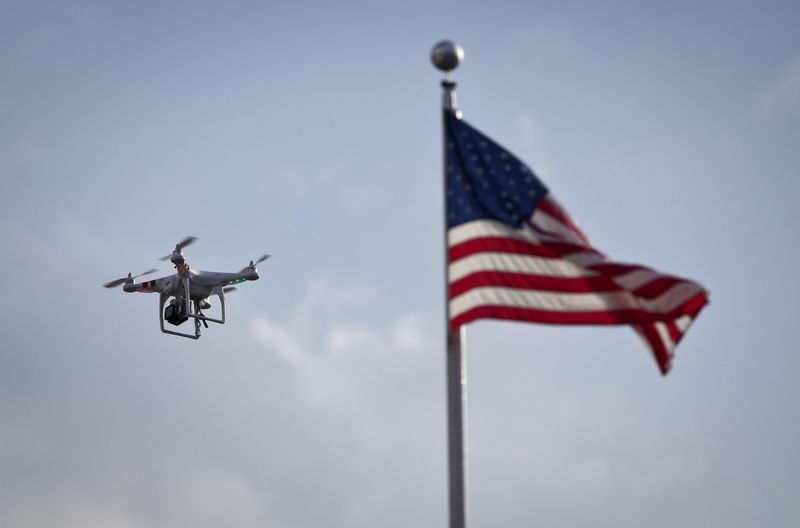By Alwyn Scott
NEW YORK (Reuters) - Americans shopping for toy remote-controlled airplanes or helicopters may find, sometime in the near future, that they come with unexpected accessories: A raft of new regulations.
The Federal Aviation Administration, by the end of the month, is expected to propose new rules governing small unmanned aircraft systems, the first major overhaul of its drone policy.
The agency is closely guarding details, saying only that the rules will cover a wide range of users flying aircraft or drones weighing 55 pounds or less.
But legal and policy experts who have advised the FAA and lobbied on drone regulations said they predict the new regulations will include restrictions on hundreds of thousands of people who fly quad-copters or toy planes in parks or backyards.
The focus on toy aircraft is a new twist. Such regulations have been in the works for years, largely because of pressure from businesses wanting to use drones for tasks such as aerial photography.
Experts said that based on existing drone guidelines, the new FAA rules, expected to take at least a year to kick in, will likely require, among other things, recreational fliers to either join a community-based model aircraft organization - or obtain authorization from the FAA. The rules also could place other restrictions on people who fly drones recklessly, the experts said. If the rules omit discussion of recreational fliers, the experts added, that could sow confusion on what type of flying is allowed.
"There's basically going to be two options," said Richard Hanson, director of government affairs at the Academy of Model Aeronautics, who has lobbied Congress and advised the FAA on drone regulations. "You either participate in a community-based organization or you have to follow the rules as if you are commercial operator."
RISKY FLIERS
Bona-fide hobbyists have gotten little attention, largely because Congress in 2012 exempted them from new FAA rules - provided they adhere to, among other things, the safety code of a community-based organization, such as AMA, which has more than 170,000 members.
But that carve-out doesn't apply to an estimated 300,000 people in the U.S. who have bought toy aircraft and are largely unaware of hobbyist association safety codes.
These casual fliers, including people who get a toy drone as a holiday gift, are blamed for dangerous flights near airports, stadiums and military bases. The FAA recently documented more than 190 close calls, including instances of drones flying within 50 feet of jetliners landing in New York and elsewhere.
"Unfortunately, there are lots of people who've bought these things at the local store or online who don't know anything about the AMA or its safety guidelines," said Ted Ellett, a former FAA chief counsel and head of the unmanned aircraft systems group at law firm Hogan Lovells in Washington, D.C.
In the absence of rules, the FAA has largely relied on local and state police to prosecute risky drone fliers.
GOING SOFT?
Experts say it makes little sense for the FAA to be softer on hobbyists than on commercial fliers, who have an interest in flying responsibly to avoid lawsuits and protect their brands.
"Drone technology is far surpassing the flying skills of the people who have them," said Paul Fraidenburgh, an aviation lawyer at Buchalter Nemer in Irvine, California. "The fact that someone is receiving money makes me feel safer about their operation."
Ellett, the former FAA chief counsel, said the FAA should issue clear definitions for flights that are exempt from the new rules - and those that are not. Otherwise, he added, confusion will be the order of the day.
The AMA has lobbied for the hobbyist exemption, arguing its members have an 80-year history of safe piloting, even with planes that are fitted with jet engines and can zoom at 200 miles an hour, the AMA's Hanson said. Those enthusiasts are not the toy-flying amateurs who order a quad-copter from Amazon.com Inc that experts expect the FAA's new rule to address.
Hanson served on an FAA advisory group that recommended light regulation for drones weighing a pound or two but would ratchet up requirements for flying aircraft of greater size and power. He said his understanding of current FAA policy suggests the agency won't provide that kind of stepped regulation.
The AMA's safety code covers items the FAA has said should apply to hobbyists: not flying carelessly or recklessly, avoiding prohibited areas, staying below 400 feet, keeping clear of manned aircraft and not "flying directly over unprotected people." The AMA's $58 annual membership fee includes $2.5 million in liability insurance.

The FAA said at a congressional hearing on Wednesday it is trying to educate recreational fliers about safe flight, recognizing that final rules are at least a year away. In the same vein, Amazon has linked its online "drone store" to the AMA, the FAA and other sites with safety information.
(Reporting by Alwyn Scott, editing by Hank Gilman)